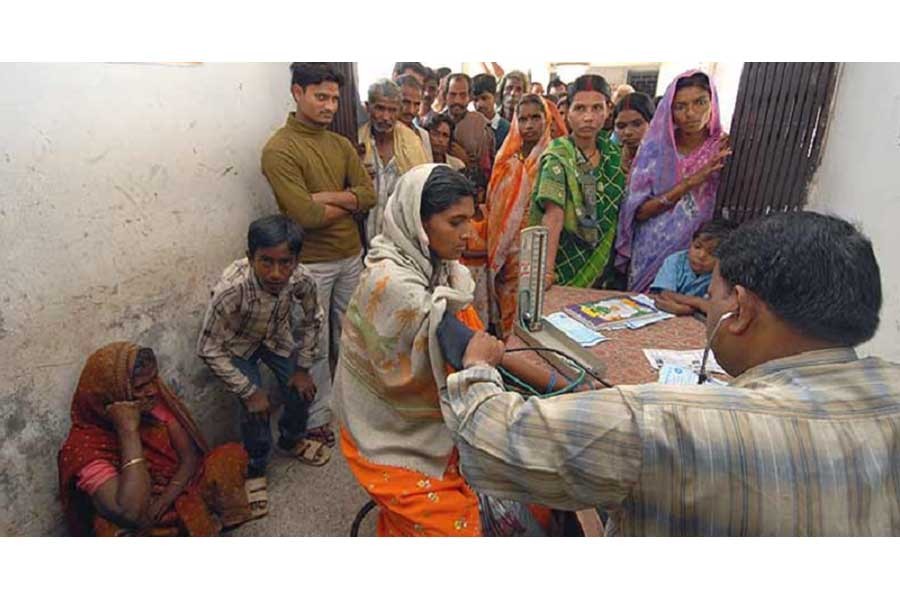Health risks are apparently posing as the greatest threat to the lives and livelihoods of the people in Bangladesh, according to a recent study. The country's healthcare system gets ineffective frequently in reaching the poor, generates less benefit for the poor than the rich, and imposes repressive cost burdens on poor households.
Consistently inequitable nature of healthcare system, in fact, limits the access to healthcare by the poor who need it the most. Many raised concern about attaining the health-related Millennium Development Goals (MDGs) in low-income countries like Bangladesh without improving the ability of health systems to reach the poor effectively.
Capacity constraints in the public hospitals are prohibiting a lot of patients from getting fair treatment. Despite serious limitations, most of the public hospitals are offering emergency services, but the quality of treatment is not at all satisfactory. They can hardly cope with the ever-rising demand for treatment. Doctors and nurses seldom take care of the patients in most of the public and private hospitals. Free medicare facilities and medicines are rarely available.
A section of dishonest public hospital officials influence patients to get admitted into private clinics citing better treatment. Private clinics offer a slice of their income to these touts. Medicare services in public hospitals beggar description. Poor people have no alternative other than going to these hospitals. It is hard to get services there. Specialist physicians are mostly busy with their private practices. Even on-duty doctors leave hospital premises to visit patients in private clinics.
Private hospitals have created options for the people to seek health services from various facilities other than the government ones only. What is surprising is that more than 40 per cent of private hospitals, clinics, blood banks and diagnostic centres are not registered with the relevant government agency. According to the Director General of Heath Services (DGHS), there are 612 government hospitals, 128 secondary and tertiary level government hospitals, 484 government hospitals at upazila and union level, 4,280 private registered hospitals and clinics and 9,061 private registered diagnostic centres in the country.
The hospital and clinic wing under the DG Health does not have the capacity to regularly monitor mushroom growth of the clinics, hospitals, blood banks, and diagnostic centres in the private sector. Moreover, activities of the wing are limited to Dhaka city only as there is a lack of adequate manpower.
Apart from the government-owned hospitals, the situation in private clinics and diagnostic centres outside Dhaka is even worse. They do not have proper equipment, manpower, doctors, nurses, emergency servoces, ambulances and authorised blood bank needed for a full-fledged clinic.
In most of the developed and developing countries, at least 30 minutes and beyond are generally earmarked for one patient. Doctors there visit only 20 patients a day. Private practice for a public hospital doctor is strictly prohibited.
But in case of Bangladesh, a physician gives on an average only half a minute to a patient, according to a global survey. Poor doctor-patient communication, in fact, hinders correct diagnosis. Many doctors in Bangladesh are reluctant to improve such communication which is one of the key elements of treatment.
Although Bangladeshi physicians have proved their worth in treating diseases abroad, they give little importance to good doctor-patient relations here. Patients, after all, are not cars or televisions, which can be fixed with a 'tune-up'. They are living human beings whose humanity must be respected if treatment is to succeed.
It is essential for the government to revise the curriculum in medical, nursing and pharmacy schools that train healthcare professionals, so that they are trained according to the new global paradigm. Business schools should be encouraged to develop executive training programmers in healthcare, which will effectively reduce the talent gap for leadership in this area.
Due to inadequate and largely negligible treatment in the public and private hospitals, many people are opting for alternative medicines. The alternative medicine industry that covers ayurvedic, unani, herbal and homoeopathy is growing by about 12-20 per cent annually due to rising demand for natural medicines by the people across the globe.
According to a recent report, the annual turnover of the alternative medicines may reach Tk 10 billion by 2020, provided proper state policy and support for the investors are in place. The present turnover of the industry which is plagued with various problems is Tk 6.0 billion.
However, the criteria set by the drug administration is not encouraging for the investors as the minimum investment required here is Tk 10 million while the maximum is Tk 50 million. It is also mandatory to appoint a pharmacist or chemist along with alternative medicine professionals and modern machinery to set up a manufacturing plant.
The government should develop and implement international standard examination centres for doctors, nurses and pharmacists to be employment in the Joint Commission International (JCI) accredited organisations. Local hospitals need to be encouraged to evaluate their services by JCI and meet their compliances. Partnerships between the western and local hospitals should be developed to devise newer ways to deliver healthcare.
Sometime back, the World Bank (WB) asked the Bangladesh government to contract out some of the medical services to the private sector 'at certain levels.' The WB recommendation followed a study on the state of affairs relating to the country's medical services. The study found a state of anarchy prevailing in the sector. Common people, especially the poor ones, are not getting medicare services at all.
The World Bank advised the government for contracting out medical services to non-government organisations (NGOs), private institutions of fame etc. Such contracting-out should be based on a win-win situation. The private sector organisations must be chosen from among the lists of transparent and accountable firms and organisations.
In the wake of chronic mismanagement, negligence and widespread corruption in the public healthcare entities of the country, it is necessary that there should be an effective mechanism to streamline their activities. Treatment through alternative medicines should also be encouraged to make 'Healthcare for all' a success.


